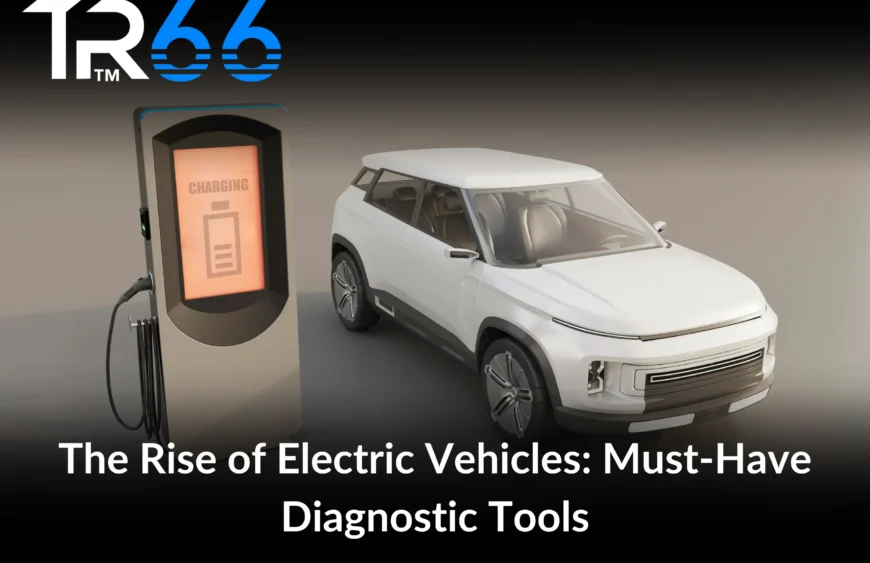Introduction
The automotive industry is undergoing a significant transformation with the rise of electric vehicles (EVs). As more consumers switch to EVs to reduce their carbon footprint and embrace cleaner transportation, the need for specialized diagnostic tools is growing. Traditional vehicles and EVs differ greatly in terms of technology, and mechanics now require cutting-edge tools to efficiently service these vehicles.
In this article, we will explore the key diagnostic tools every shop should have to cater to the growing demand for EV repairs. We’ll also highlight how Techroute66 can help you equip your shop with these essential tools.
The Shift Toward Electric Vehicles
Electric vehicles have gained substantial momentum in recent years. According to industry reports, global EV sales are projected to continue growing, driven by environmental concerns, advancements in technology, and government incentives. With this shift, repair shops must adapt to the new requirements of maintaining and servicing electric vehicles.
Unlike traditional internal combustion engine (ICE) vehicles, EVs operate on complex electrical systems, batteries, and advanced software. As a result, conventional diagnostic tools may not be sufficient for diagnosing EV issues. Specialized tools are needed to ensure accurate diagnostics and repairs.
Why Specialized Diagnostic Tools for EVs?
EVs have different components, including high-voltage batteries, inverters, electric motors, and advanced control systems. Diagnosing issues with these parts requires specific knowledge and tools. Here’s why investing in diagnostic tools for EVs is crucial:
- Precision and Safety: Working on high-voltage systems can be dangerous without the right tools and expertise. Specialized diagnostic tools ensure precise, safe troubleshooting.
- Software Integration: EVs rely heavily on software for system management. Diagnostic tools that integrate with software updates and analyze EV-specific systems are essential.
- Complexity of Components: From battery health to motor control, the complexity of EV components means that traditional OBD-II readers may not provide the level of detail required for accurate diagnostics.
Must-Have Diagnostic Tools for Electric Vehicle Repairs
1. EV-Specific OBD-II Scanners
While standard OBD-II scanners can read basic error codes, they often fall short when diagnosing EVs. EV-specific OBD-II scanners are designed to read the unique error codes related to battery management systems (BMS), electric drive systems, and charging circuits. These scanners provide more detailed information on EV-specific components, ensuring a more accurate diagnosis.
2. High-Voltage Multimeter
EVs operate on high-voltage systems, making it crucial to have the right tools for measuring and diagnosing electrical issues. A high-voltage multimeter is designed to safely measure electrical outputs in EVs, ensuring accurate readings without putting mechanics at risk.
3. Insulation Resistance Tester
EVs are equipped with high-voltage components that require constant monitoring for insulation breakdowns. An insulation resistance tester is essential for ensuring the safety and functionality of these components. This tool measures the resistance of electrical insulation, helping detect potential issues before they cause critical failures.
4. Battery Management System (BMS) Diagnostic Tool
The battery is the heart of any EV, and ensuring its health is paramount. A BMS diagnostic tool provides detailed insights into the battery’s condition, including state of charge, state of health, and temperature monitoring. This tool is indispensable for assessing battery performance and identifying potential issues such as capacity degradation or overheating.
5. Electric Motor Testing Equipment
Electric motors are another critical component of EVs. Motor testing equipment helps mechanics analyze motor efficiency, detect any performance issues, and ensure that the motor is functioning optimally. This tool also aids in identifying issues with regenerative braking systems, which are integral to EVs.
Key Benefits of Using Specialized EV Diagnostic Tools
- Enhanced Efficiency: With the right tools, diagnostics can be performed more quickly, reducing downtime and improving workflow in the repair shop.
- Accurate Diagnoses: Specialized tools provide more detailed and accurate diagnostics, minimizing the risk of misdiagnosis.
- Improved Safety: EVs operate on high-voltage systems, and the right diagnostic tools ensure that mechanics can work safely without compromising their safety or the vehicle’s performance.
- Increased Customer Satisfaction: By using advanced tools, you can offer better service, leading to greater customer satisfaction and loyalty.
Conclusion
The rise of electric vehicles has brought about new challenges for repair shops. As EVs become more mainstream, investing in specialized diagnostic tools is no longer optional—it’s a necessity. These tools not only ensure accurate diagnostics but also improve safety and efficiency in the repair process. At Techroute66, we offer a wide selection of must-have EV diagnostic tools designed to help your shop stay ahead of the curve in this evolving industry.
Equip your shop with the tools you need to excel in EV repairs—shop Techroute66’s range of diagnostic tools today.


FAQs
1. Why do EVs require specialized diagnostic tools?
Electric vehicles rely on different systems than traditional cars, including high-voltage batteries, electric motors, and advanced software. Specialized tools are necessary to accurately diagnose and repair these unique components, ensuring both safety and precision.
2. Can I use a standard OBD-II scanner for EVs?
While a standard OBD-II scanner may read basic codes, it won’t provide the detailed data needed to diagnose complex EV systems. An EV-specific OBD-II scanner is essential for understanding error codes related to battery management, electric motors, and more.
3. What safety precautions should be taken when working on EVs?
Working on EVs requires specialized training and equipment due to the high-voltage systems involved. Always use high-voltage-rated tools and wear protective equipment to minimize the risk of electric shock or injury.
4. How do I check the health of an EV battery?
A Battery Management System (BMS) diagnostic tool is the most effective way to monitor an EV battery’s health. It provides insights into the battery’s state of charge, state of health, and temperature, allowing mechanics to detect potential issues early.
5. Where can I purchase EV diagnostic tools?
You can find a wide range of specialized diagnostic tools for EVs and more atTechroute66.






